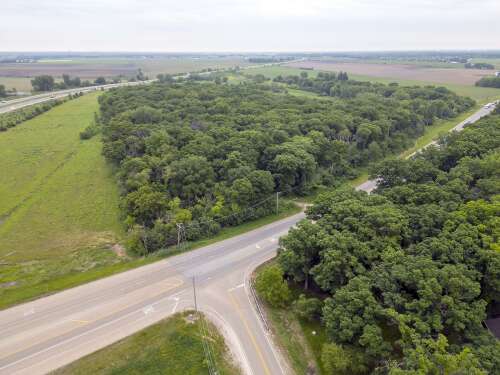Crown Community Development has officially asked to turn 861 acres of farmland near Sugar Grove into houses, apartments, offices and businesses.
The company announced Monday it has filed a land-use application asking Sugar Grove to annex the land, zone it and subdivide it.
The Grove would have a 244-acre commercial and business park and nearly 400 acres of housing. It would also have an area called the Town Center, with a new Sugar Grove Village Hall, a park, food truck court, stores and residences; 200 acres of green space; and 70 acres of mature tree groves, according to a news release and a land plan on its website.
The current plan would put the Town Center and residences southeast of the intersection of Interstate 88 and Route 47. The commercial and business park would be north of I-88.
An artist’s rendering shows what a Town Center could look like at The Grove development proposed for Sugar Grove.
Courtesy of Crown Community Development
The request comes as the village board considers whether it should create a tax increment financing district for the land.
Crown proposes to accomplish this through planned development district zoning. In a PDD, the land is divided into “zoning lots,” and zoning standards would be customized for the development.
Crown bought the land between 2001 and 2006. The village annexed the site in 2013 and gave it estate-residential zoning, its most restrictive class.
In 2019, Crown proposed a similar development but withdrew it when it became clear — after much community protesting — that the village board would not approve it. In 2020, the village de-annexed the site, at Crown’s request.
The developer announced the new plan in November 2023.
In May, an advisory panel refused to recommend the creation of the TIF district. Three members voted to recommend, three voted against, and six voted “present.”
A consultant estimates there is about $350 million worth of TIF-eligible work to be done to make the project a win financially for a developer. That would include grading, roadwork, and extending water, sanitary and storm sewers and other utilities to the property.
The work could be paid for from revenue created by any increase in property taxes generated by the property.
There are signs opposing a tax increment financing district and a development proposed for Sugar Grove on Route 47 near Seavey Road.
Susan Sarkauskas/[email protected]
Several hundred people opposing the TIF district and the proposed project attended a public hearing at a village board meeting in June.
Opponents dispute a consultant’s finding that the land is blighted due to flooding and that runoff from the site contributes to flooding in the Blackberry Creek watershed.
They also worry about increased traffic, particularly on Route 47, from trucks going to and from warehouses.
The village board has not voted yet on the TIF district.
